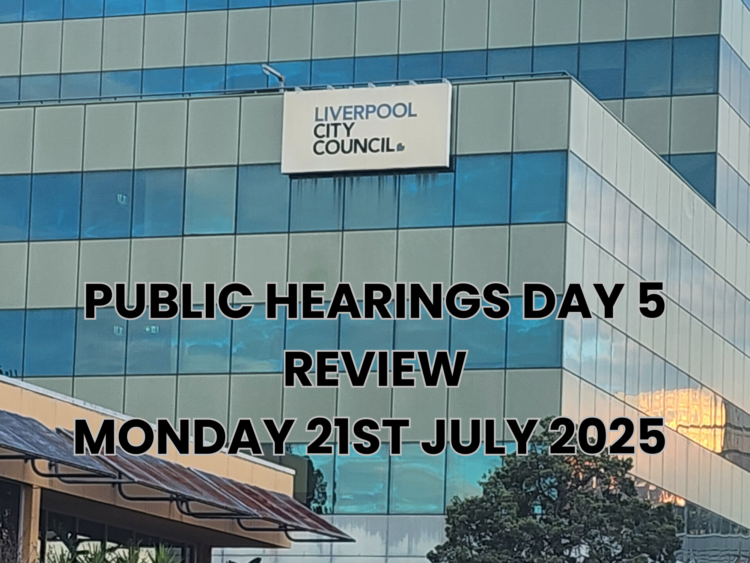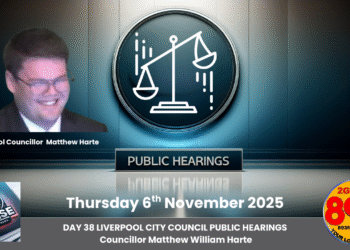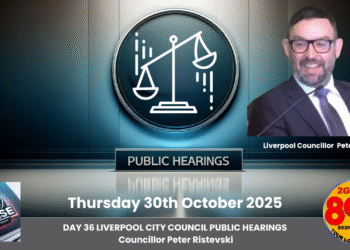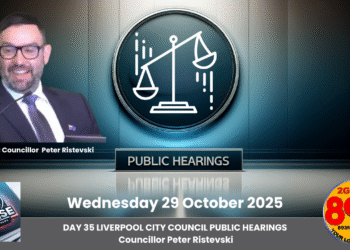Mr Portelli’s evidence on Day 5 wrapped up some loose ends from last week and delved into new, troubling areas about council operations and financial decisions. I’ve broken it down into simple terms to highlight what matters most to us as residents.
Mr Portelli confirmed key dates about his time at Liverpool City Council. He was terminated as General Manager in March 2014, though he remained an employee on leave until July 2014. After a long break and years of unpaid work for personal reasons, he returned in November 2022 at the request of acting CEO Tina Bono for a six-week consultancy role, working about 20 hours a week. This led to a three-month contract as Acting Director of Corporate Services starting January 2023, replacing Paul Perrett. Later, after a competitive process in May or June 2023, he was permanently appointed to the role under CEO John Ajaka, with a selection panel including Ajaka, Mr Blackadder, and another CEO from Campbelltown Council. He noted he did no paid work, including for other councils, between 2014 and 2022.
Code of Conduct Complaints: A Growing Burden
A major issue raised by Mr Portelli was the sharp rise in code of conduct complaints at the council. He explained that in past years, they’d see only about five complaints annually, but since September of the current council term, over 115 have been lodged by June—far more than usual. As Director of Corporate Services, with the general counsel and chief financial officer reporting to him, he oversees the complaints process. He described it as slow, costly, and a heavy drain on staff time. Complaints go to the CEO first for an initial check to see if they’re trivial or can be resolved informally. If serious, they move to the governance team for review, then to external reviewers, which adds significant expense. The CEO even sought help from the Office of Local Government (OLG), but they declined to step in, leaving the burden on council resources.
For Liverpool residents, this is worrying because it means our rates are funding a drawn-out, expensive process with no clear resolution in sight. Mr Portelli pointed out that even when complaints are substantiated, the council decides the outcome, which might just be a note in the records with no real penalty. He believes the process needs reform, a view shared by a recent ministerial announcement for a review. This flood of complaints could be clogging up council operations, diverting focus and money from community needs like parks or road repairs.
Internal Ombudsman Debate: Is It Needed?
Mr Portelli was asked about the idea of having an internal ombudsman—a dedicated person to handle complaints independently. He noted that when he returned in 2023, the ombudsman role was vacant after the previous holder passed away, and a deputy position was only temporarily filled. By August 2023, following a structural review and budget constraints, the CEO decided to scrap the role, moving its duties to the governance team, which has since grown. Complaints can still be sent to external bodies like the state ombudsman, ICAC, or OLG if needed. Mr Portelli didn’t see a benefit to bringing back the role, mentioning that only a few councils in NSW have one, often those under administration, and Liverpool hadn’t had one during his earlier 2004-2014 tenure without issue. He also recalled a 2023 Audit and Risk Improvement Committee discussion where a member suggested ombudsmen are linked to troubled councils, reinforcing his scepticism.
This is a point of contention for residents who might want an independent figure to ensure fair handling of disputes, especially with the current complaint surge. Without an ombudsman, there’s a risk that internal biases or workload pressures could affect how grievances are managed, potentially hiding deeper issues from public view and impacting trust in council fairness.
Budget Decisions and Allegations of Creative Accounting
The most alarming part of Mr Portelli’s testimony came during questioning by Ms K Richardson SC, counsel for Mayor Ned Mannoun, about the council’s budget process for 2024. Mr Portelli confirmed that in the lead-up to the budget going on public exhibition around 14 May 2024, then-CEO John Ajaka gave directions on what to include, such as the sale of a property at 3 Hoxton Park Road. This addition, added at the last minute per Ajaka’s instruction, turned a projected deficit into a surplus, raising questions about timing and intent. More shockingly, Mr Portelli claimed that in March 2024, Ajaka called him into his office and directed him to use “creative accounting” to find $25 million for the budget. Portelli refused to follow this direction, standing firm against what he saw as improper financial manipulation.
For ratepayers, this allegation is deeply troubling. The term “creative accounting” suggests possible attempts to fudge numbers, which could mislead the public about the council’s true financial health. With a budget over $530 million, any hint of improper practices could mean our rates are being mismanaged or used to paint a rosier picture than reality. This also ties into broader concerns from earlier hearing days about financial sustainability and major expenditures like the Cowpasture Road purchase, making us question who’s really looking out for our money.
Why This Matters to Liverpool Residents
As Liverpool ratepayers, we’re funding a council with serious operational and financial challenges, and Day 5’s evidence from Mr Portelli hits hard. The explosion of code of conduct complaints—over 115 in less than a year—means our rates are being spent on a slow, costly process that might not even resolve issues effectively, pulling resources away from services we rely on. The debate over an internal ombudsman adds to worries about transparency; without an independent check, can we trust complaints are handled fairly?
Most concerning is the claim of “creative accounting” directed by a former CEO. If true, it suggests a risk of financial trickery at the top level, which could hide deficits or justify decisions—like property sales or rate hikes—that don’t serve our community’s best interests. This comes on top of past issues like high termination payouts and questionable purchases raised in earlier days, painting a picture of a council struggling with trust and accountability.
What’s Next for the Inquiry?
The inquiry will keep rolling with more witnesses, likely focusing on financial practices, governance structures, and specific decisions like property dealings at Liverpool City Council. The serious allegation against a former CEO will probably draw further scrutiny, as will the complaints process overload, to see how deep these problems run.
Please tune in to 89.3 FM 2GLF Community radio from 9am Thursday as we take the Pulse on Liverpool and Fairfield which will be streamed online www.893fm.com.au




























Taken in account this big number of complains,what is percentage of councils rate ,additional cost for all of us.Ho is the culprit in this case.All inancial manipulation been made and created in previous councils assembly.